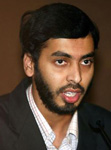Secret plan to keep Mohamed Haneef in detention even after bail exposed
 Melbourne, Nov 2 : Confidential emails between top Australian Federal Police (AFP) agents and a senior public servant advising Immigration Minister Kevin Andrews indicate that there was a secret plan to thwart the decision of the magistrate to release the Indian born doctor Mohamed Haneef on bail.
Melbourne, Nov 2 : Confidential emails between top Australian Federal Police (AFP) agents and a senior public servant advising Immigration Minister Kevin Andrews indicate that there was a secret plan to thwart the decision of the magistrate to release the Indian born doctor Mohamed Haneef on bail.
The emails show the AFP was aware of a weekend "contingency" plan to ensure that Dr Haneef remains in jail if Andrews revokes his visa under the Migration Act in case Brisbane magistrate Jacqui Payne granted bail to the Indian doctor.
The emails, obtained under Freedom of Information laws by Dr Haneef's lawyers, show that the AFP was uncertain on July 14, after an initial bail hearing whether Dr Haneef would be freed two days later by Payne.
The first email, written by Brisbane-based counter-terrorism co-ordinator David Craig to commanders of the AFP's counter-terrorism unit at 5.22 p.m. on July 14, states: "Contingencies for containing Haneef and detaining him under the Migration Act, if he is granted bail on Monday, are in place as per arrangements today."
Under the Migration Act, such a contingency plan necessarily needed to involve Andrews.
The email was forwarded at 8.10 a.m. on July 16 by agent Luke Morrish, the AFP's Canberra-based acting manager for domestic counter-terrorism, to top Immigration Department public servant Peter White.
White, the department's Assistant Secretary responsible for character assessment and war crimes screening, gave Andrews comprehensive advice on his powers and his authority to cancel Dr Haneef's visa and keep him in custody on the basis of secret evidence.
About three hours after Agent Morrish forwarded the email to White on July 16, Payne granted Dr Haneef bail over a terrorism-related charge.
One of the factors relied on by Payne was the extraordinary weakness of the AFP's case against Dr Haneef, who had repeatedly and strenuously asserted his innocence of any connection with terrorist acts carried out in Britain in June.
The Gold Coast Hospital registrar was kept behind bars after Andrews made his controversial decision on July 16 to revoke the visa.
The release of the emails comes amid continuing calls for a royal commission-style inquiry, three months after the case against Dr Haneef collapsed in disgrace amid disclosures in The Australian of serious errors by police and prosecutors from the Commonwealth DPP.
Andrews, who has repeatedly maintained that Dr Haneef failed a "character test" arising from his connection to his second cousins, is instructing lawyers for the Crown to appeal against a Federal Court decision that Dr Haneef's visa should be reinstated.
"I'm concerned about it. Obviously it's apparent that there was communication about pulling his visa prior to the magistrate handing down her decision," Dr Haneef's solicitor, Peter Russo, said.
Describing the emails as "a very significant piece in the jigsaw of information", Russo called on AFP Commissioner Mick Keelty, Andrews and anyone else who knew of the secret contingency plan to "come clean and explain exactly what discussions did take place".
A leading defence lawyer and close follower of the Haneef case, barrister Greg Barns said that the emails showed that "the AFP in conjunction with the Government were essentially completely undermining the judicial process".
The disclosure of the emails will be used against Andrews, who has always insisted that he made his decision to revoke Dr Haneef's visa under the Migration Act and that it was "unrelated to the question of proceedings in the criminal court in Brisbane".
A spokeswoman for Mr Andrews told The Australian that she was "shocked and a bit concerned" at the disclosure in the emails.
"That's something, to be honest, I'm a bit lost for words on because it shocks me," said Kate Walshe, adding that she would seek urgent advice from Andrews.
After getting advice from Andrews last night, Walshe said that the minister had "absolutely not" been involved in any "contingency" plan to thwart Payne: "It's not our email and it's not something that we considered beforehand." (ANI)